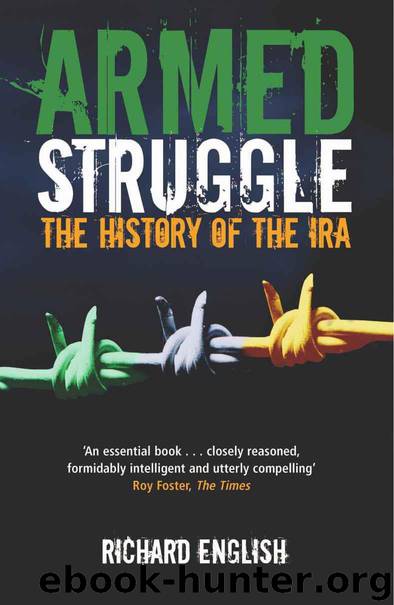Armed Struggle by English Richard

Author:English, Richard [English, Richard]
Language: eng
Format: mobi, epub
Publisher: Macmillan Publishers UK
Published: 2012-10-18T23:00:00+00:00
The evolving tension between these two responses – rejecting partitionism, but welcoming concessions as a result of republican action – was to define the ambiguous nature of republican politics during subsequent years.
Moreover, republican hostility towards the Agreement was tempered by the fact that Ulster’s unionists so hated the Hillsborough deal.59 In the zero-sum world of northern politics, your opponent’s hostility towards a given development might be seen as suggesting that the development had within it some benefit for yourself. And unionists were certainly horrified, their sense of betrayal at what the Agreement entailed intensified because they had been left out of its production, not even consulted. Indeed, unionist reaction was worse than Margaret Thatcher appears to have anticipated,60 the air becoming ‘thick with bitter cries, as baffled thousands dream they are betrayed, stripped of the comfort of safe loyalties, their ancient friends considered enemies’.61 Sinn Féin’s Tom Hartley: ‘After eighty-one you had the rise of Sinn Féin, and the Dublin government moved to convince the British government that they needed to give the SDLP a helping hand. And it was one of the main objectives of the Anglo-Irish Agreement. And in a sense they took their eye off the unionist ball. They were so focused on defeating republicans that they didn’t quite notice the unionists.’62
Moreover, the Agreement did not depend upon local support in Northern Ireland for its sustenance (one of its great strengths, according to some observers);63 as long as the two governments wanted to uphold the deal, then the deal would be upheld. In this, the Agreement differed from initiatives such as James Prior’s devolutionary 1982–6 Northern Ireland Assembly.64 Indeed, when unionist hostility to the 1985 Hillsborough accord was effectively faced down by the London government, it seemed to contain greater potential still for Irish republicans. As one senior Sinn Féiner later observed: ‘We saw the coming together of Dublin and London, and this proved London could be shifted. The fact that Britain moved unilaterally was pivotal. They hit the unionists a kick in the balls, saying to them, “We’ve tried to work with you but that failed.” That didn’t go unrecorded in republicanism.’65
The 1985 Anglo-Irish Agreement both reflected and reinforced a growing harmony between London and Dublin in terms of dealing with Northern Ireland. Hillsborough formally changed the dynamic between the two governments, with Dublin now having a structural role within the running of the north of Ireland. And it was within this context that 1980s Provisional politics developed and matured. In the early 1980s Sinn Féin proudly located itself as ‘a political organisation dedicated to a democratic socialist republic for Ireland based on the Proclamation announced in Dublin at the commencement of the Easter 1916 Rising’.66 In the summer of 1983 the party’s President was Ruairí Ó Brádaigh, its Vice-Presidents Daithi O’Connell and Gerry Adams. But at the ard fheis, or convention, in November Ó Brádaigh was replaced as President by Adams, as power within the republican movement was ever more firmly grasped by the northerners.
Download
This site does not store any files on its server. We only index and link to content provided by other sites. Please contact the content providers to delete copyright contents if any and email us, we'll remove relevant links or contents immediately.
| Africa | Americas |
| Arctic & Antarctica | Asia |
| Australia & Oceania | Europe |
| Middle East | Russia |
| United States | World |
| Ancient Civilizations | Military |
| Historical Study & Educational Resources |
Room 212 by Kate Stewart(5120)
The Crown by Robert Lacey(4814)
Endurance: Shackleton's Incredible Voyage by Alfred Lansing(4782)
The Iron Duke by The Iron Duke(4354)
The Rape of Nanking by Iris Chang(4211)
Joan of Arc by Mary Gordon(4109)
Killing England by Bill O'Reilly(4001)
Say Nothing by Patrick Radden Keefe(3985)
I'll Give You the Sun by Jandy Nelson(3447)
Shadow of Night by Deborah Harkness(3368)
Hitler's Monsters by Eric Kurlander(3342)
Mary, Queen of Scots, and the Murder of Lord Darnley by Alison Weir(3210)
Blood and Sand by Alex Von Tunzelmann(3203)
Eleanor & Park by Rainbow Rowell(3172)
Darkest Hour by Anthony McCarten(3133)
Margaret Thatcher: The Autobiography by Thatcher Margaret(3082)
Book of Life by Deborah Harkness(2938)
Red Famine: Stalin's War on Ukraine by Anne Applebaum(2933)
The One Memory of Flora Banks by Emily Barr(2863)
